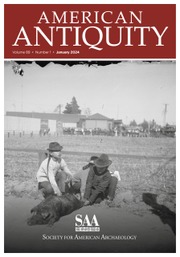Article contents
Was Agriculture Impossible during the Pleistocene but Mandatory during the Holocene? A Climate Change Hypothesis
Published online by Cambridge University Press: 20 January 2017
Abstract
Several independent trajectories of subsistence intensification, often leading to agriculture, began during the Holocene. No plant-rich intensifications are known from the Pleistocene, even from the late Pleistocene when human populations were otherwise quite sophisticated. Recent data from ice and ocean-core climate proxies show that last glacial climates were extremely hostile to agriculture—dry, low in atmospheric CO2, and extremely variable on quite short time scales. We hypothesize that agriculture was impossible under last-glacial conditions. The quite abrupt final amelioration of the climate was followed immediately by the beginnings of plant-intensive resource-use strategies in some areas, although the turn to plants was much later elsewhere. Almost all trajectories of subsistence intensification in the Holocene are progressive, and eventually agriculture became the dominant strategy in all but marginal environments. We hypothesize that, in the Holocene, agriculture was, in the long run, compulsory. We use a mathematical analysis to argue that the rate-limiting process for intensification trajectories must generally be the rate of innovation of subsistence technology or subsistence-related social organization. At the observed rates of innovation, population growth will always be rapid enough to sustain a high level of population pressure. Several processes appear to retard rates of cultural evolution below the maxima we observe in the most favorable cases.
Résumé
Varias trayectorias independenties de la intensificatión del sustenta, muchas de las cuales conducieron a la agricultura, empezaron durante el Holoceno. No conocemos ninguna intensificació que usara muchos recursos vegetates durante el Pleistocene, inclusive el Pleistocene ultimo, cuando las poblaciones humanas fueron muy sofisticadas en otros ámbitos. Datas recientes de cilindros de hielo sacados de Groenlandia, y de sedimentos oceánicos, muestran que la ultima glaciation fué extremadamente hostil a la agricultura, ya que filé—seca, baja en CO2, y extremadamente variable en el corto plazo. Proponemos que la agricultura fué imposible en estas condiciones de la ultima glaciation. La súbita mejora del clima al final de la glaciation fué seguida inmediatamente por la initiation de usos mas intensives de los recursos végétales en algunos lugares, aunque mucho mas tarde en otras partes. Casi todo las trajectores de intensificatión en el Holoceno eran occurrieron sin retroceso. Finalmente, la agricultura se convirtió en el modo principal de sustento en todas paries, excepta por zonas muyfrlas о muy secas. En el Holoceno, hacemos el hipótesis que la agricultura se vuelve, a final de cuentas, obligatoria. Usamos un andlisis matemático para formular el hipáthe-sis que los procesos limitante de la taza de intensificatión debe generalmente ser la taza de la inovación tecnológica en las estrategias de sustento, о la taza de inovación en las formas de organazación social en relation al sustento. Con las tazas de inovación que se observan, el crecimiento de la población siempre es suficientemente rapido como para crear alto nivel de presión poblacional. Al parecer, varies processes normalmente retardan la velocidad de la evolution cultural abajo de las tazas máximas que observamos en el modela.
- Type
- Articles
- Information
- Copyright
- Copyright © The Society for American Archaeology 2001
References
References Cited
- 387
- Cited by


